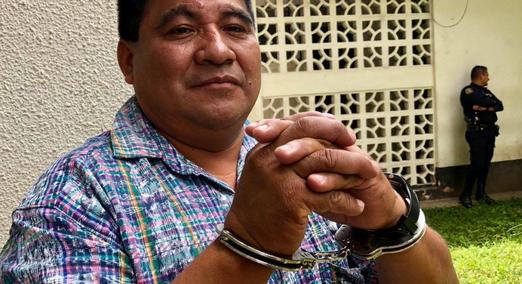By Duncan Tucker
Locked up in filthy, overcrowded conditions in a prison system notorious for deadly riots and beheadings, Bernardo Caal Xol is paying the price for standing up to corporate interests and authorities who routinely misuse Guatemala’s justice system to silence human rights defenders.
Caal, 49, is a teacher and community leader from Santa María Cahabón, a Q’eqchi’ Mayan territory in the lush northern region of Alta Verapaz. Since 2015, he has filed several legal challenges against the OXEC hydroelectric project for allegedly destroying 15 hectares of forest and three sacred hills and restricting access to two sacred rivers where Q’eqchi’ people have fished and bathed for generations — in violation of an international law enshrining Indigenous peoples’ rights to free, prior and informed consent over projects that affect their territories.
Arrested in January 2018, Caal is serving a sentence of seven years and four months for supposedly detaining and robbing four employees of an OXEC subcontractor during a 2015 protest. Guatemala’s Supreme Court rejected his latest appeal in September, but he should never have spent a day behind bars. At Amnesty International, we found irregularities, negligence and a lack of evidence in the case against Caal, and declared him a prisoner of conscience, jailed solely because of his activism.
Caal’s defense of human rights has also provoked threats and smear campaigns against him, raising serious concerns over his safety. Guatemala was the world’s seventh-deadliest country for land and environmental defenders in 2020, and at least 11 activists against hydroelectric projects have been killed there in recent years.
U.N. experts recently warned that Caal’s health is deteriorating in a prison with “deficient infrastructure, food and sanitation.” Visits have been heavily restricted during the pandemic, with his wife only allowed in sporadically while his elderly mother and two daughters have been unable to see him.
Caal spends much of his time behind bars writing letters, often denouncing Florentino Pérez, the Spanish billionaire best known as president of the soccer club Real Madrid. Pérez also heads the Spanish construction giant ACS, whose subsidiary Cobra built Renace, another hydroelectric project on the Cahabón river. In a 2014 visit to supervise construction, Pérez gifted Guatemala’s then-president a Real Madrid jersey and boasted of Renace’s “exemplary social responsibility, with respect for others, the environment and the communities.”
But Caal says it has inflicted terrible harm. In one handwritten letter, he accuses Pérez of piping and diverting the river without consulting the affected communities, thus “leaving thousands of Q’eqchi’ Mayan brothers and sisters without access to water.” In another, he implores Real Madrid’s fans to tell their club president to “leave the sacred Cahabón river in peace.” ACS and Cobra did not respond to requests for comment.
As with OXEC, Guatemala’s courts allowed the Renace project to proceed, despite acknowledging the violation of local communities’ rights to prior consent. Renace has denied any wrongdoing, but a Spanish government body found it had caused “significant changes to some stretches of the Cahabón river … with potential negative effects on local communities.”
Access to rivers is vital in Alta Verapaz, one of Guatemala’s poorest regions, where only 28 percent of the population have running water in their homes. Restricting access can have terrible consequences for local communities who have long depended on rivers as a source of fish, crabs, snails and edible plants. Renace and OXEC say they have helped reduce malnutrition through their local health and social development programs, yet Alta Verapaz has accounted for 75 percent of nationwide child deaths from malnutrition this year, and at least 137 infants have died from acute malnutrition there since 2016.
To add insult to injury, affected communities rarely reap the benefits of hydroelectric projects, as the areas where dams are concentrated have the least access to electricity in all of Guatemala.
Public anger at Caal’s imprisonment has coincided with national discontent over economic inequality, the government’s handling of the pandemic and its dismantling of efforts to combat corruption and impunity. The unrest erupted in a nationwide strike in July, with broad swaths of society joining Indigenous leaders in calling for a complete transformation in how Guatemala is governed.
Respect for human rights must be central moving forward. When Guatemala represents Central America at the COP26 conference in Glasgow, as one of the countries worst affected by the global climate crisis, it is expected to raise the need to recover and protect ecosystems affected by hydroelectric works. Yet it cannot continue to criminalize the environmental defenders who play such a vital role in protecting these same ecosystems.
Guatemala’s authorities must start by overturning Caal’s conviction and releasing him immediately. Instead of imprisoning courageous human rights defenders, they must protect them and guarantee the rights of Indigenous peoples to prevent further injustices.
Duncan Tucker is Amnesty International’s regional media manager for the Americas. Bernardo Caal Xol’s case is featured in the 2021 edition of Write for Rights, Amnesty International’s annual global letter-writing campaign.
This article originally appeared in the Washington Post.













